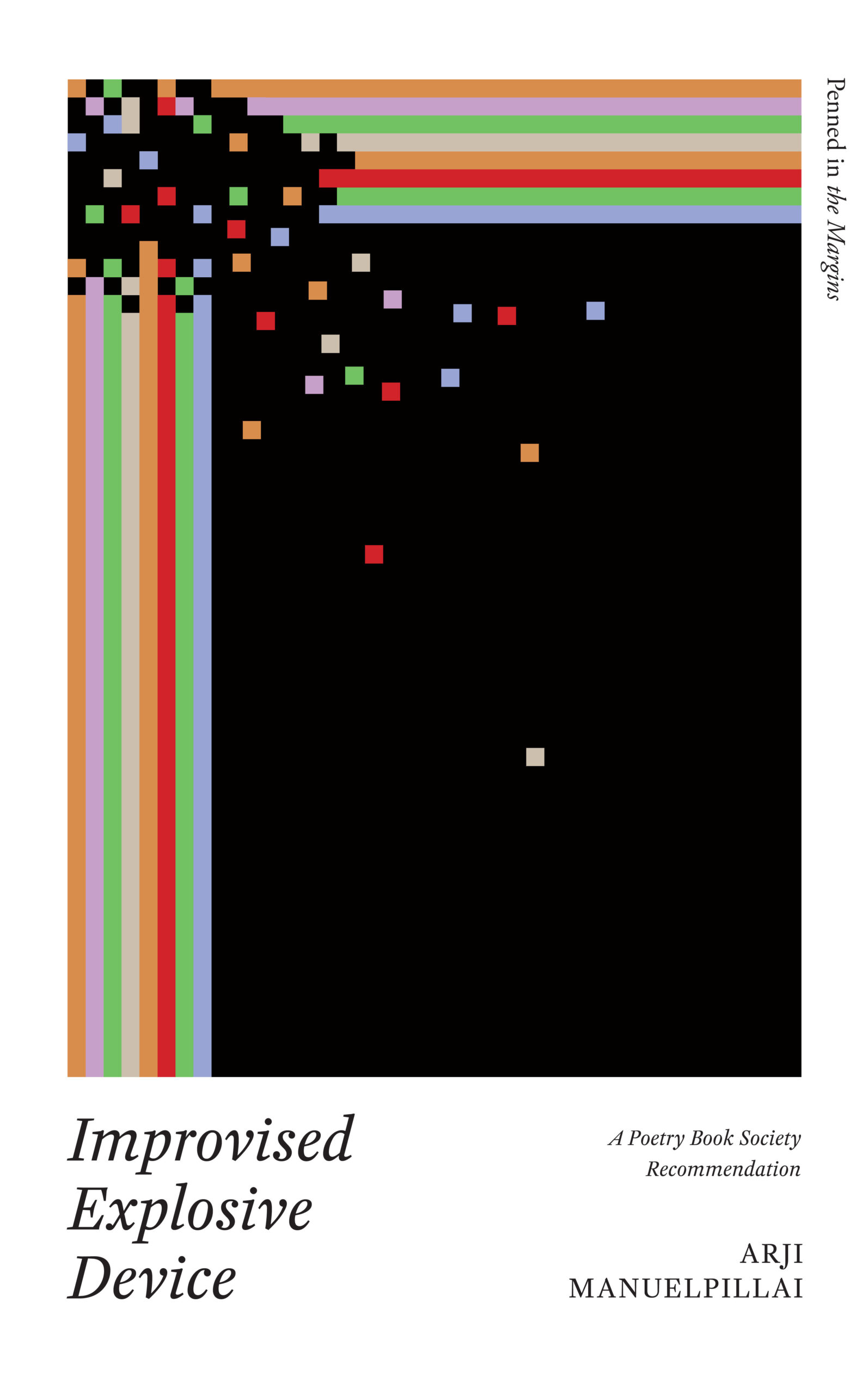
Improvised Explosive Device by Arji Manuelpillai
Penned in the Margins
(106 pages of poetry)
The first time I heard a poem by Arji Manuelpillai, he was reading from this collection on BBC Radio 3’s ‘The Verb’. The poem was called ‘Ways of Being Heard’, and I did not like it, particularly the line where our persona, a onetime fascist explaining how he lived down to the labels people assigned him, offers us ‘a flip-book of words: // anarchists, fairies, woke militants, Tories’, then asks, ‘does it hurt yet?’. At the time I was stunned – was this poem seriously asking us to believe that these examples compared with an actual fascist saying that he only offered a Nazi salute in response to being called a ‘Nazi’?
I thought that this was just another re-statement of the frankly bizarre platitude that ‘labelling’ someone with terms like ‘fascist’ (even people who are actually attempting to enact fascism) is in some way harmful to the anti-fascist cause; that it got in the way of a ‘dialogue’ that would ‘mend the rift’. The poet’s words struck me as cowardly.
But nevertheless, I decided to embrace what fellow-poet Rishi Dastidar called this book’s spirit of ‘radical empathy’, and in the teeth of my cynicism and misgivings I decided to buy and read the whole collection. I am very glad I did.
For any readers who, as I first did, might interpret Dastidar’s comments as standard-issue marketing puff, do not be misled: these are poems in which the act of empathising is vividly enacted as being unable to escape the reality of pain, even at points where you might desperately want to. We are, to quote one poem, like the cameraman in a nature documentary, watching an elephant ‘dragged // to death by a circle of hyenas’ – or, in the same poem, a news cameraman seeing ‘a brown man [slump] to the pavement’ – then being unable to unsee the image that night as ‘an expanding sinkhole’ appears beside our bed. No matter how much we want to feel like ‘we are not part of // the sound of flesh pulled from the jugular’, involvement is inescapable.
This makes sense when you know these poems arose out of, among other things, a series of interviews with former members of a variety of extremist groups, including ISIS and the English Defence League. As a man of Sri Lankan heritage who has had to endure the racist everyday currents of life in the UK, including when asked if he wonders what colour his child will be, or when ‘a good friend ripped a slur open wide like a packet of crisps’, Manuelpillai’s poetic persona is muscular from necessity, able to carry a great deal of the seething, often justified resentment at social inequity that can be the beginnings of violent extremism.
Moreover since, as another poem puts it, ‘[t]o say a tree begins at the bark / is like saying a killer / begins at the killing’, these poems manifest vividly the racist and imperialist history that still reaches into the present day, warping and poisoning its supposed beneficiaries just as much as its immediate victims. In ‘Way Back’, the whitewashed nostalgia of ‘the good old days’ is explicitly a time when ‘a father punched a son / for sleeping with a wog’, and when ‘syphilis fondled the town’.
These poems are clear-eyed about the true source of the hopelessness and alienation that turns people to violence. An interlude sequence beginning ‘everything we used to love / is a Tesco Express’ might be the most beautiful expression I have yet found of the predations of global capitalism, closely followed by the poem ‘A Decent Pair of Nikes’, where a man waving a meat cleaver in a church is really ‘a man wanting a life worth more than £90’.
I didn’t like everything: I still have my reservations about that one poem, ‘Ways of Being Heard’, and the reader’s mileage may vary on the nihilism that threatens to engulf the final poems. But when extremist violence is seen as a form of weaponised despair, as the collection as a whole does clearly and brilliantly, then there is immense value in that same despair being seen, heard and understood. These poems need to be read.
Tim Kiely is a criminal barrister and poet based in London who work has appeared in Under the Radar, South Bank Poetry and Magma. His pamphlet Hymn to the Smoke is published by Indigo Dreams. Follow him on Instagram @timkiely1.
Arji Manuelpillai’s Improvised Explosive Device is published by Penned in the Margins and available here.
